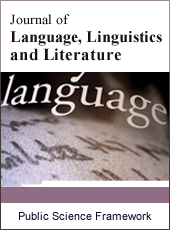Journal of Language, Linguistics and Literature
Articles Information
Journal of Language, Linguistics and Literature, Vol.1, No.6, Dec. 2015, Pub. Date: Oct. 27, 2015
Self-Regulation and Speaking Proficiency in Iranian EFL Learners
Pages: 182-188 Views: 3726 Downloads: 2501
[01]
Elham Mahjoob, English Department, Ilam University, Ilam, Iran.
This study is to investigate the relationship between Iranian EFL learners self regulation and their speaking proficiency. 60 advanced female and male students studying in the adult section of the ILI, Shiraz, Iran participated in the study. Correlational analysis carried out to determine the relationship between variables. Two t-tests run to compare the students from the high with those of the low group regarding the two variables. Findings revealed there is a weak relationship between self-regulation and Iranian EFL learners' speaking proficiency. Participants' speaking proficiency was evaluated using IELTS speaking test. Generally, the high achievers, comparing with the low achievers were more proficient in performing the speaking test. Regarding the result of t-test for speaking, high achievers are found as self-regulated as the low achievers in speaking a foreign language. There are just minor differences between the students from the two groups in the order they used the self-regulation strategies.
Self-Regulation, Speaking Proficiency, High-Achievers, Low-Achievers
[01]
Boekaerts, M., Pintrich, P.R., & Zeidner, M. (Eds.). (2000). Handbook of self-regulation. San Diego, CA: Academic press.
[02]
Brown, A. L., Bransford, J. D., Ferrara, R. A. & Campione, J. C. (1983). Learning, remembering and understanding. In J. H. Flavell & E. M. Markman (Hrsg), Handbook of child psychology. Cognitive development (S. 77-166). New York: Wiley. Retrieved May 26, 2011 from http://onlinelibrary.wiley.com.
[03]
Chaney, A.L., & T.L. Burk. (1998). Teaching Oral Communication in Grades K-8. Boston: Allyn & Bacon. Retrieved 18 April, 2010 from http://books.google.com/books.
[04]
Cheng, C. K. (2011). The Role of Self-regulated Learning in Enhancing Learning Performance. The International Journal of esearch and Review, 6 (1), 1-16. Retrieved June 18, 2010 from http://journals.cambrige.org/action/displayFulltext?.
[05]
Gaythwaite, E. (2006). Metacognitive self-regulation , self-efficacy for learning and performance, and critical thinking as predictors of academic success and course retention among community college students enrolled in online, telecourse, and traditional public speaking courses. MA thesis: Central Orlando, Florida. Retrieved May 18, 2011from http://www.nflrc.hawaii.edu/RFL/articles/erten.
[06]
Pintrich, P.R. (2000) The role of goal orientation in self-regulated learning. In M. Boekaerts, P.R. Pintrich, and M. Zeidner Eds.), Handbook of self-regulation (pp 451-502). San Diego, CA: Academic Press.
[07]
Pintrich, P. R., & De Groot, E.V. (1990). Motivational and self-regulated learning components of classroom academic chievment. Journal of educational psychology, 82, 33-40. Retrieved Oct 29, 2010 from http://www.springerlink.com/content/70515417747/.
[08]
Schunk, D.H. (2005). Self-regulated learning: The educational legacy of Paul R. Pintrich. Educational Psychologist, 40, 85-94.
[09]
Turan, S., & Demirel, Ö. (2010). The relationship between self-regulated learning skills and achievement. H. U. Journal of ducation, 38, 279-291. Retrieved June 29, 2011 from http://www.plosone.org.
[10]
Wang, W., & Motteram, G. (2006). CALL in China. IATEFL Voices, May-June (190), 78.
[11]
Zarei, F. (2008). Self-regulated learning and its relationship with EFL learners’ reading strategy use and self-assessment. MA thesis in teaching English as a foreign language, faculty of literature & hummanities. Shiraz State University, Shiraz, Iran.
[12]
Zimmerman, B.J. (2001). Theories of self-regulated learning and academic achievement: An overview and analysis. In B.J. Zimmerman & D.H. Schunk (Eds.), Self-regulated learning and academic achievement: Theoretical Perspectives (2nd ed. pp. 1-38). Mahwah, NJ: Lawrence Erlbaum Associates, Inc.

ISSN Print: 2381-7054
ISSN Online: 2381-7062
Current Issue:
Vol. 6, Issue 1, March Submit a Manuscript Join Editorial Board Join Reviewer Team
ISSN Online: 2381-7062
Current Issue:
Vol. 6, Issue 1, March Submit a Manuscript Join Editorial Board Join Reviewer Team
| About This Journal |
| All Issues |
| Open Access |
| Indexing |
| Payment Information |
| Author Guidelines |
| Review Process |
| Publication Ethics |
| Editorial Board |
| Peer Reviewers |


